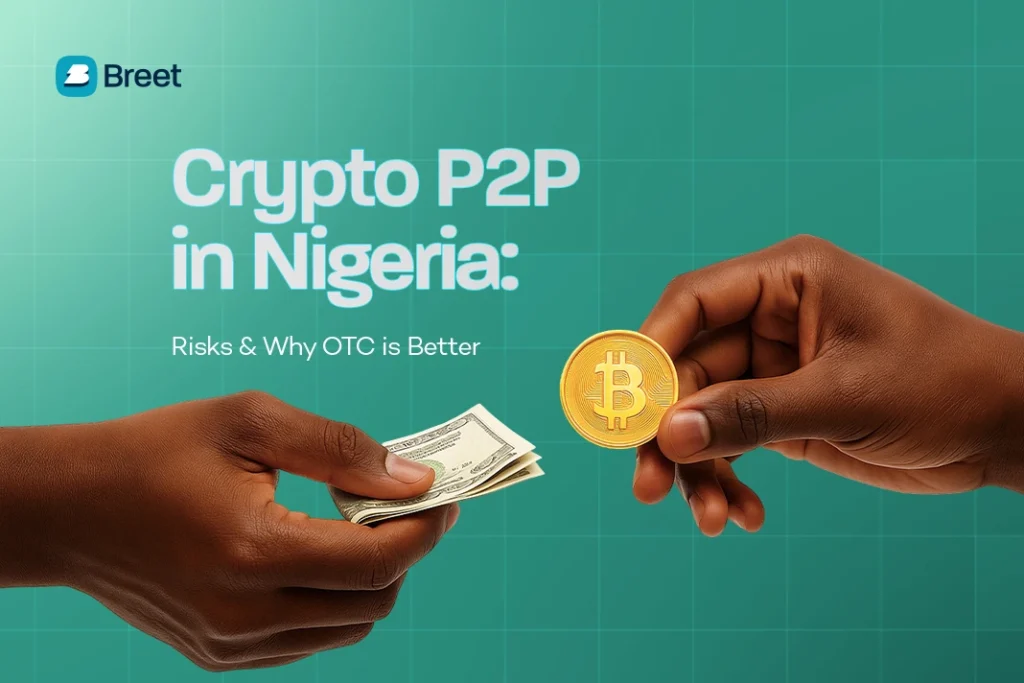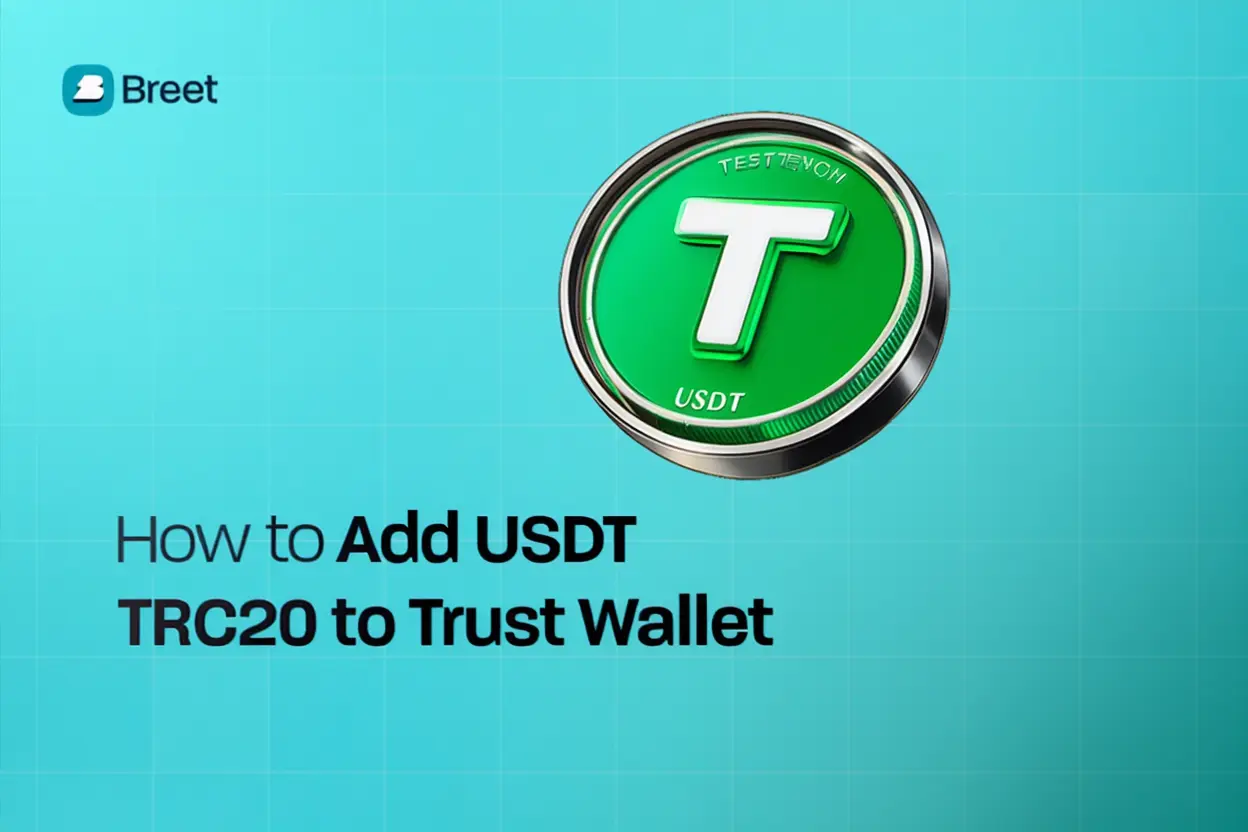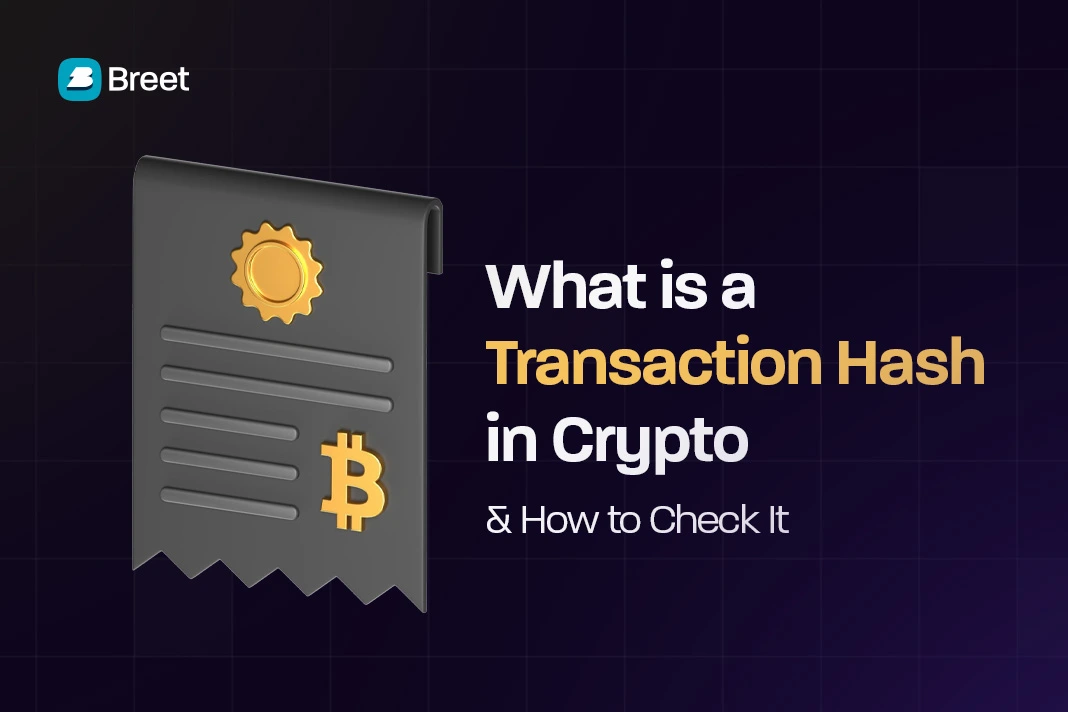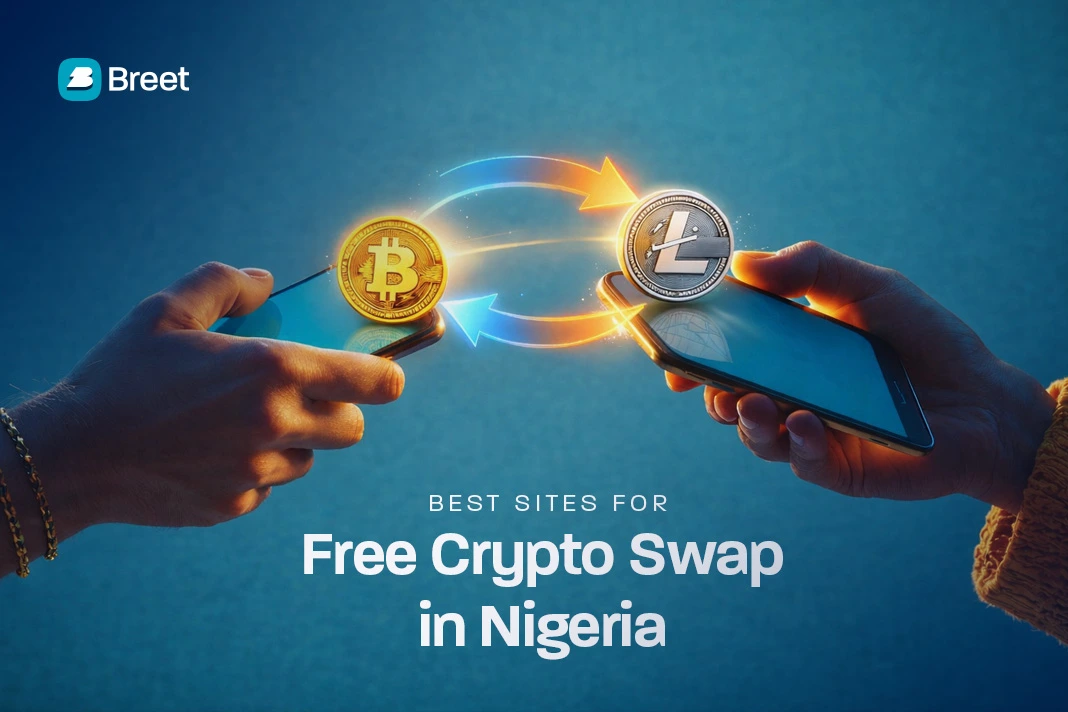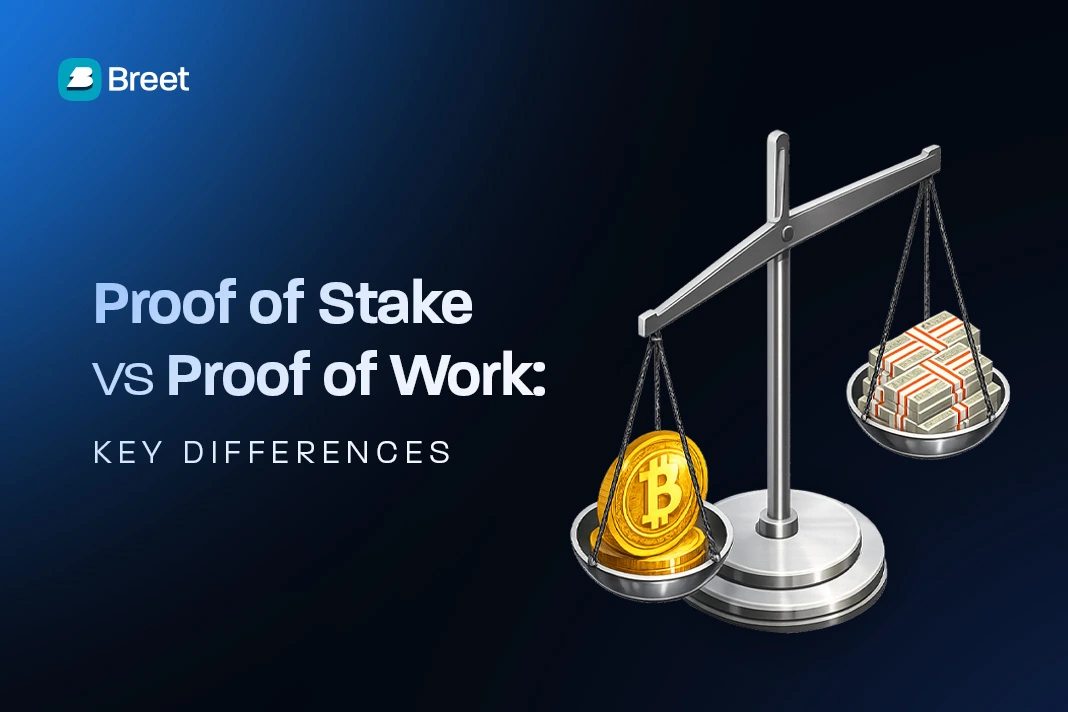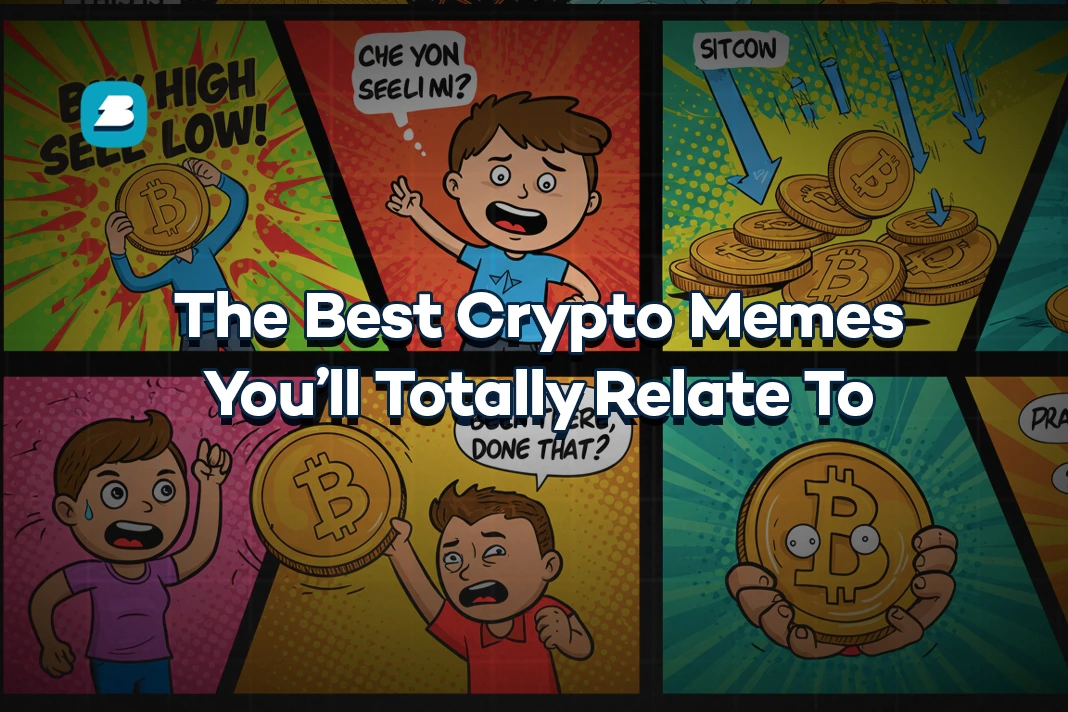If you trade crypto in Nigeria, you’ve probably used P2P before.
Maybe because you can negotiate prices and sometimes get a better rate than what OTC platforms offer. That’s one of the main reasons many Nigerians stick with it, especially since the CBN restrictions made direct crypto exchange access difficult.
According to recent reports, Nigeria recorded around $59 billion in crypto transactions between July 2023 and June 2024, with a large portion happening through P2P trading. But while P2P might seem like a smart way to get more value, it often comes with serious risks; from fraud and fake payments to frozen bank accounts. The truth is, it’s getting harder to justify those risks when safer options like OTC trading now exist.
In this article, we’ll show you why Crypto P2P is not safe to use for you, and what exactly you’ve been missing out on by not using OTC services like Breet
7 Common Crypto P2P Risks You’ll Face in Nigeria
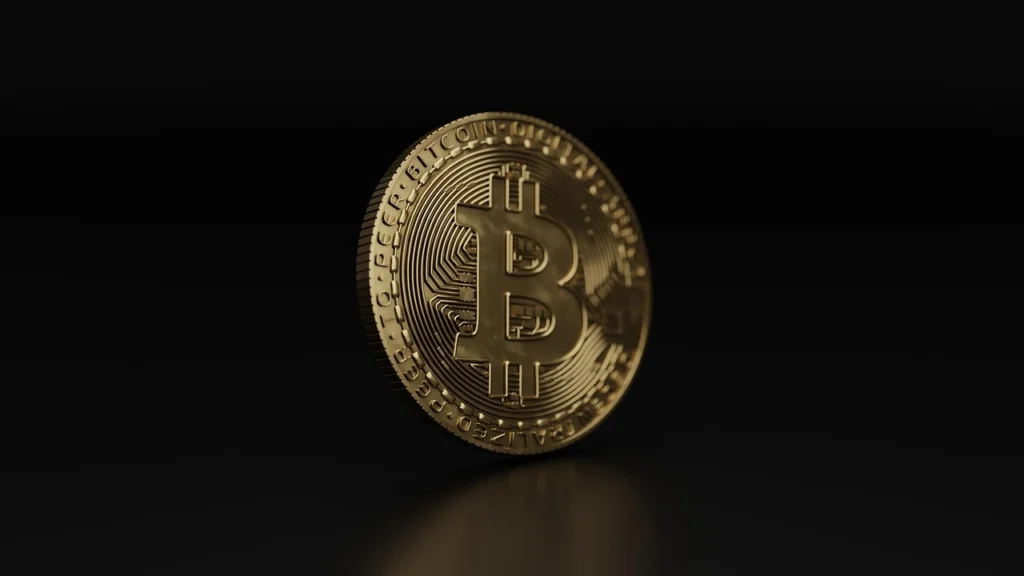
Many Nigerians still believe P2P trading is “just how crypto works,” but the reality is far less simple. For every person who successfully completes a trade, there are several others who lose money, waste time, or deal with frozen accounts. The sad part is that most people do not realize how risky P2P really is until it happens to them.
Let’s look at some of the biggest problems with P2P trading in Nigeria and why sticking with it might be costing you more than you think.
- Fraudulent Traders and Hidden Identities
- Fake “Proofs” of Payment and Payment Reversals
- Bank Account Freezes and Compliance Flags
- Price Manipulation and Hidden Losses
- Time-Waste, Uncertainty and Unnecessary Stress
- Lack of Accountability or Support
- Identity Theft and Impersonation
1. Fraudulent Traders and Hidden Identities
You may think you’ve found a trusted seller or buyer on a P2P platform, but many operate under fake names or identities. For example, the Economic and Financial Crimes Commission (EFCC) recently convicted a P2P crypto trader in Lagos who used a female identity on social media (“Jessie Randall”) to defraud unsuspecting victims.
When you trade P2P, you might simply be trusting a profile picture and a star rating, not the actual person behind it. That means if the trader disappears, blocks you, or simply vanishes after payment, you’re on your own.
What You Stand to Lose: Your crypto, your money, and possibly your bank account access.
2. Fake “Proofs” of Payment and Payment Reversals
One of the most common Crypto P2P scams in Nigeria involves fake proof of payment. A buyer sends you a convincing screenshot showing a “successful transfer,” but the money never arrives in your account. By the time you realize it, you’ve already released your crypto.
These scams are especially common on WhatsApp, Telegram, and even some P2P marketplaces where users fake alerts or use cloned banking apps.
For example one guide on P2P trading in Nigeria reports how screenshots are routinely used to trick sellers into releasing their coins early.
And then there’s the scenario: you post your payment but the buyer claims they never paid, the bank reverses it, and you lose both the money and the coins.
What You Stand to Lose: Your crypto and your peace of mind. Once you release that coin, it’s gone forever. There’s no refund, no support, and no way to trace the scammer.
Related:
- Binance P2P in Nigeria: Top 7 Alternatives
3. Bank Account Freezes and Compliance Flags
Many Nigerians trading through P2P have had their bank accounts suddenly frozen because of transactions linked to flagged or fraudulent accounts.
Even if you’re innocent, your name can get caught in the middle of a financial investigation. There have been real-life cases where people could not access their funds for weeks, simply because they traded with someone involved in a scam.
What You Stand to Lose: Access to your money. You could wake up to a frozen account and months of explaining to your bank that you were not part of any illegal transaction.
4. Price Negotiation Doesn’t Always Save You From Risk
Yes, P2P seems attractive because you can negotiate prices. But that freedom often works against you. Some traders use fake rates to lure you in, only to cancel or demand renegotiation at the last minute. Others take advantage of new traders who don’t understand market prices, leading them to sell crypto far below real value.
What You Stand to Lose: Your hard-earned value. You might think you’re getting a great deal, but in reality, you’re losing money every time you trade.
5. Time-Waste, Uncertainty and Unnecessary Stress
Unlike structured exchanges or OTC platforms, P2P deals depend on two strangers coordinating payments manually. One small delay from the buyer’s end and your transaction could take hours or even days. If they back out or dispute a trade, your funds stay stuck until the platform’s moderator intervenes, and that can take forever.
Even when nothing overtly wrong happens, P2P can be a major drain on your time and patience. You have to find a counterpart, negotiate, wait for payment, verify, go back and forth, and sometimes you still end up disappointed.
What You Stand to Lose: Your time and your confidence in crypto trading. Constant delays can make you miss opportunities or turn simple trades into stressful waiting games.
6. Lack of Accountability or Support
When things go wrong on P2P, you are mostly on your own. Platforms only act as middlemen, and they rarely take full responsibility for losses. Once your crypto is gone, customer support can’t recover it or refund you.
Many Nigerians have shared stories online of losing entire savings because they trusted a “verified” trader who turned out to be a fraudster.
What You Stand to Lose: Your money and your trust in crypto. Without real accountability, even honest traders become targets in a space full of risk and uncertainty.
7. Identity Theft and Impersonation
Scammers are getting smarter. Many now pretend to be verified traders, customer support staff, or even platform representatives to gain your trust. They often use stolen profile pictures, fake reviews, or cloned social media accounts to appear legitimate.
Once you share personal details like your wallet address, account info, or even screenshots of transactions, they can use it to scam others, or worse, impersonate you in future trades.
What You Stand to Lose: Your reputation and security. Once your details are in the wrong hands, they can be used for fraud, putting you at risk of being linked to crimes you didn’t commit.
Related:
- KuCoin P2P in Nigeria: Review & Top 7 Alternatives
Why OTC Trading with a Platform Like Breet Is the Safer and Smarter Choice for Nigerians
1. Higher and More Competitive Rates
Many Nigerians turn to P2P because they believe it offers better rates than OTC platforms. That might have been true years ago, but not anymore. Breet’s rates are now highly competitive, often matching or even surpassing what you find on P2P markets. The difference is that you get those great rates without the risk of fraud or fake payments.
What this Means for You: You no longer need to gamble with your money just to get a slightly higher return. With Breet, you can sell your crypto at great rates and still enjoy a safe, automated process.
2. Instant Crypto-to-Cash Conversion
Unlike P2P, where you have to wait for a buyer or manually confirm payments, Breet automates everything. Once you send your crypto to your unique Breet wallet address, the system automatically converts it to Naira or another supported currency. Payments are processed instantly, so you can withdraw your money without delays or disputes.
What This Means for You: You do not have to chase buyers, wait for confirmations, or worry about fake alerts. Everything happens automatically and securely.
3. No Human Error, No Negotiations, No Drama
P2P trading depends on people. OTC trading with Breet depends on systems, and systems do not get emotional or dishonest. You no longer need to spend time negotiating prices, verifying proofs of payment, or worrying about fake traders.
Breet’s automated system eliminates those problems by offering real-time market rates that update automatically.
What This Means for You: You get fair, transparent pricing without the stress or risk of human manipulation.
4. Security and Bank Protection
Breet’s OTC model ensures you never share your personal bank details or communicate directly with random traders. Your transactions happen inside a secure ecosystem, with all data encrypted and protected.
Breet also operates under strong compliance measures, reducing the risk of bank freezes or fraud.
What This Means for You: You stay safe from scams, fake payments, and the stress of explaining suspicious transactions to your bank.
5. Designed for Freelancers and Businesses
More Nigerian freelancers and small businesses now use Breet to receive crypto payments from clients abroad. Instead of using risky P2P channels, they simply receive crypto in Breet, convert it to Naira, and withdraw directly to their bank accounts.
This makes cross-border payments faster and more reliable.
What This Means for You: You can work with global clients and get paid instantly, without worrying about conversion issues or blocked funds.
6. Fast Withdrawals and Growing Trust
One of the biggest reasons Breet is growing so fast is its speed and consistency. Withdrawals to Nigerian bank accounts are 287 seconds or less, and users can also withdraw in Ghanaian Cedis for cross-border transactions.
Over time, this reliability has built a strong reputation for Breet among everyday crypto users and professionals alike.
What This Means for You: Join over 250,000+ people who use Breet for instant Crypto to cash conversion.
Read Also:
- Paxful Shuts Down: Full Details & Alternative for Nigerians
Don’t Wait to Be a Victim of P2P Risks, Switch to Breet

Every day, more Nigerians are realizing that P2P is no longer worth the trouble. Between fake payments, frozen accounts, and countless scams, too many traders have learned the hard way that “fast and flexible” can come at a painful cost. You do not have to be the next victim.
Platforms like Breet now make it easy to trade crypto safely, instantly, and at competitive rates — all without the risks that come with P2P. It is simple, secure, and built for everyday Nigerians who want peace of mind while trading crypto.
